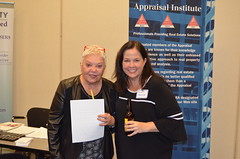Monthly Archives: June 2016
ICAP’s 2016 Collinsville Seminar Summary
2016 Illinois Appraisers Update Seminar
June 13, 2016, Doubletree Hotel, Collinsville, IL
by Karen Emerle, SRA
ICAP Reporter & Photographer
ICAP President Mike Morris, ARA, MAI welcomed all attendees to the first of ICAP’s three 2016 Appraiser Update seminars. Mike enumerated ICAPs accomplishments on behalf of Illinois appraisers and outlined ICAP’s various participation in the local, state, and national issues affecting the appraisal profession.
ICAP’s Bill (HB3333) passed the Illinois House of Representatives on May 31, 2016. Drafted by ICAP and sponsored by Representative Robert Rita of Illinois 28th District, the Bill amends Illinois Appraisal Management Company Registration Act to create an Appraisal Management Company Recovery Fund. This Bill will make it possible for appraisers to collect payment from Appraisal Management Companies (AMC) that declare bankruptcy. The Bill will be sent to the Governor for signature within 30 days. The Governor will have 60 days to sign the bill or return it with a veto. Mike urged all appraisers to support this Bill by sending comments to the Governor in favor of the Bill.
ICAP submitted comments to the Appraiser Qualifications Board (AQB) and the Appraisal Standards Board (ASB) in response to the AQB’s First Exposure Draft of Proposed Changes to the Real Property Appraiser Qualifications Criteria and the ASB’s First Exposure Draft of Proposed Changes for the 2018-19 edition of the Uniform Standards of Professional Appraisal Practice. ICAP is working with NAR to seek remedies and address those issues arising from the new FHA Single Family Handbook. The Handbook became effective September 14, 2014 and was revised March 14, 2016. The ICAP Advantage newsletter is an exclusive benefit of ICAP membership. The Newsletter provides ICAP membership updates on the various issues affecting Illinois appraisers and on ICAP’s continuing work on behalf of Illinois appraisers.
Mike extended a heartfelt thank you to the ICAP membership for attending ICAPs seminars and faithful contributions, and to the many Board members and committee members who volunteer their time working hard on behalf of the appraisal profession.
Statistics & the Appraisal Process, the opening session, was presented by John Urubek, MAI, CCIM. Mr. Urubek commented that the Ainternet is here to stay. Click on it and someone is collecting your data. Sooner or later it becomes a statistic. The presentations purpose is to encourage more use of statistics in your day to day appraisal practice, to expand your skill sets and experience by applying what you learn, and explain how to use creative ways to create more credible reports.
To solve the problem with confidence one needs a larger sample size. The focus of the talk is the applications of statistics in real world appraisal problems. Mr Urubek asked the question, Should I use statistics in my appraisal? A The answer is Yes. According to Wikipedia the history of statistics can be traced back to 1749. Appraisals refer to probability. USPAP SR1-1(a) states an appraiser must: be aware of, understand, and correctly employ those recognized methods and techniques that are necessary to produce a credible appraisal.
Through the use of four examples, Mr. Urubek provided creative and practical ways to use statistics in the appraisal process. Definitions of Descriptive and inferential statistics were presented. Examples included questions such as, A How do you do an appraisal with no sales for over six years? There was a lively discussion around Example 2, which posed the question, Can a scatter plot be used to produce a credible prediction of price? This provided a good example of an improper assumption and the improper use of statistics. Example 3 provided insight into R Squared, polynomial function and economies of scale. Example 4 asked the question, Is paired data analysis still a viable tool? Today we have a wealth of information provided by MLS databases, assessor offices and other private data providers. Mr. Urubek closed his presentation by reminding attendees that an appraisal must adhere to accepted appraisal principles, USPAP, laws and regulations, and assignment conditions.
Mr. Urubek can be reached at phone 708-557-3662 or by email at jurubek@aol.com. For those in attendance interested in learning more about statistics, Mr. Urubek will be teaching the class, Interpretation and Application of Simple Linear Regression on July 7-8, 2016. Register at: http://www.ccai.org/chicago‑courses.php
Carolyn Payne, presented The Anatomy of an Engagement Letter.A Mrs. Payne is the Assistant General Counsel for 1st Farm Credit Services. She can be reached by phone at 309-268-0346 or email at cpayne@1stfarmcredit.com.
Attendees learned the purposes of engagement letters and were provided a sample copy for edification. Utilization of an engagement letter will reduce liability, forms a contract between the appraiser and the client, outlines the services to be rendered, and specifies the type of communication to be used. Why do you need one? The use of an engagement letter allows the appraiser to control the assignment, provides expectation details such as what the appraiser is going to do and how the appraiser is getting paid, helps avoid litigation and provides contract privity.
Mrs. Payne’s presentation addressed the ingredients that should be included in an engagement and the relationship to USPAP Standard Rules 1 and 2. The type of report being prepared for the client should be put in writing. The intended use, users and type of value should be identified. It is important to describe the type of property interest being appraised, understand the interest and the current ownership and any future ownership of the client. Extraordinary assumptions and/or hypothetical conditions, if known, scope of work including what you cannot do should be included in the engagement letter.
The engagement letter sets the compensation terms for the current appraisal and outlines terms for any future work. The law provides a $15 or $25 check if one is subpoenaed to testify. In case this should occur, it is best practices to get your witness fee stated in the engagement letter. The engagement letter can also provide protection for work already done. It helps to manage client expectations by providing the timing and method of delivery. Helpful language that can be incorporated into an engagement letter can cover advertising restrictions, third-party beneficiaries, and future appraisals on the property. The engagement letter should include two signatures, the client and the appraiser. Best practices for binding electronic signatures would be to follow E-Sign. Doc-U Sign complies with E-Sign.
In closing, Mrs. Payne reminded attendees that an engagement letter is an important tool in their toolkit. It helps prevent potential litigation, helps in the collection of fees, places potential limits on liability, and reduces exposure to free deposition / court appearances or the $25 court fees.
The afternoon session started with Preparing Appraisers for the Witness Stand with Bill Broom from the Law Firm of Barrett, Twomey, Broom, Hughes & Hoke, LLP. Mr. Broom can be reached at 618-457-0473
There are a variety of situations that could involve an appraiser as an expert witness: Dissolutions of marriage, estates, tax appeals, eminent domain. Mr. Broom advised us to keep in mind the following questions: Is there any chance you will end up as an expert witness in this assignment? In answer to the question, Does your methodology change? Mr. Broom’s stated advice is, No, just take more pictures.
Mr. Brooms expertise and thorough presentation included discussion and examples of the Supreme Court Rule 213, the three types of opinion witnesses, Hearsay Evidence Rule, photographs, technology, Evidence and Discovery Depositions, and rules for witnesses in a deposition. The Supreme Court Rule 213 is full disclosure and governs all opinions and basis of opinions. Opinion witnesses include the lay witness, the independent expert witness, and controlled expert witness. Important in zoning matters is the Hearsay Evidence Rule which as a general rule says one cannot testify as to what someone else has done. Evidence and discovery depositions are serious business. They are not friendly conversations. Mr. Broom outlined basic protocol for deposition witnesses, what to do and how to act and/or respond during the process.
Hot Topics & Myths in Appraiser Liability, presented by Peter Christensen, General Counsel at LIA Administrators & Insurance Services. Contact Mr. Christensen at 800-334-0652. Three things LIA helps appraisers with are complaints to State Boards, demand letters and being sued. Mr. Christensen spoke about the current liability conditions. Most appraisers get sued by the largest national firms. In general, liability for appraisers is not out of control. In Australia, for example, the mom and pop appraisal firms are gone. Appraisals for lending purposes are only done by the large appraisal firms due largely to the huge liability insurance premiums. A typical annual premium is $27,000 with a $50,000 per claim deductible. Mr. Christensen described the variety of legal claims made, which could include elements of professional negligence, negligent misrepresentation, fraud and/or conspiracy, libel and/or defamation, and breach of contract.
Providing examples of actual cases, Mr. Christensen discussed the following questions. “Who can sue an appraiser? Whom does the appraiser owe a legal duty? In most states a professional may be liable to third parties. What can you do? Mr. Christensen reminded appraisers to explicitly clarify the intended user/use. The clarification should be kept as narrow as it can practically be done. Appraisers in attendance were also encouraged to use plain English to disclose any appraisal property issues.
Statute of Limitations, anyone? Is it a myth that an appraiser cannot be sued for an appraisal completed more than five years ago? Yes. States have their own laws and they may have no relationship to the USPAP five-year record keeping requirement. The Illinois Statute is vague due to the Discovery Rule. Mr. Christensen suggests keeping work files for at least 10 years, and at least, as a bare minimum, the appraisal report.
Mr. Christensen spoke about the emerging Mass Litigation Problem Involving Appraisers. Basically, it involves litigation investors suing appraisers for profit. The suits present cookie cutter allegations of negligence. Sometimes a cookie cutter review is attached. Often the allegations are obviously flawed. There have been 450 plus cases overall for the 2014-2016 period. So far the entities have sued a total of 600 plus appraisers in Florida, Illinois, New Jersey and Las Vegas. Mr. Christensen advised any appraisers who might be sued to not ignore it, get some help, report it to your E & O, get legal assistance, and if you are served to handle the lawsuit appropriately.
Some common reasons as to why appraisers, under their E & O policy don=t have coverage for a claim were described. They include the absence of tail coverage, prior acts or retroactive date on the appraisers E & O policy that does not cover time when the appraisal was performed, and claims made insurance. The retroactive date should be as far back as one has had a policy. If one switches insurance companies, the retroactive date is the current date. Retirement tail coverage endorsement would provide coverage for the rest of life into sunset.
What are some hot topics in claims? Mr. Christensen said the number one claim issue after a pure value claim is square footage claims. He reminded appraisers to get the measurement right, double check calculations and sketches, proof for any typos, and to not trust the borrower, sellers, MLS, or public records. Hot topic number 2 is septic tanks. The appraiser report stated the subject property was served by a sewer when in fact it was served by a septic tank. This error in reports is commonly caused by using template reports, blindly relying on the MLS, and an actual in field error. Mr. Christensen reminded attendees when there is doubt or special issues, disclose.
Presented by Brian Weaver, the Regulation Update session closed ICAPs Collinsville 2016 Illinois Appraisers Update Seminar. Mr. Weaver is the Appraisal Coordinator and AMC Coordinator for the Illinois Department of Professional & Financial Regulation.
Illinois is going paperless. Springfield needs an official email address from everyone. They would like two: a personal email and a business email address. A word of caution: Do not let the States= emails end up in your spam folder. Eventually every Illinois Appraiser License issued will include the appraiser’s photo on the card. Additional information can be found on the IDFPR website. The online Paperless Licensing Frequently Asked Questions can be found at the following link: http://www.idfpr.com/About/PaperlessFAQ.asp
Have you completed all your continuing education hours? If not, you will not be able to renew your license. There are currently 362 approved Illinois appraiser education courses; 233 in-class and 129 on-line courses. All on-line courses must have an IDECC certificate. A reminder, in Illinois it is required the USPAP update course must be completed by June 30, 2016. The Administrative Rules, Title 68, Section 1455.160 Continuing Education is available online at the IDFPR website link: http://www.idfpr.com/profs/appraisal.asp
The June 2016 IDFPR Illinois Appraiser newsletter has been published. The Department plans to send future newsletters directly to you. Read the June 2016 newsletter and check out previous newsletters online at: http://www.idfpr.com/DRE/ApprNewsletter.asp. Topics covered in the latest Issue include Paperless in Illinois, There Go My Brackets, To Eval or Not to Eval, Form Reports Q & A, AMC Fair Housing Mythology, and Experience Log & the Matrix.
Mr. Weaver reminded the appraisers in attendance of two mandatory certifications required in appraisal reports. Effective as of June 1, 2015 per Section 1455.245 Scope of Property Conditions Inspections by Real Estate Appraisers requires the following statement, “The comments by the licensed real estate appraiser contained within this appraisal report on the condition of the property do not address “standards of practice” as defined in the Home Inspector License Act [225 ILCS 441] and 68 Ill. Adm. Code 1410 and are not to be considered a home inspection or home inspection report.” Effective April 1, 2013, Section 1455.250 Appraiser Responsibilities as relating to Appraisal Management Companies Section 15-10(a) fee disclosure requirement ONLY applies to the AMC client. Read the entire Section 1455.250 online at the following link: http://www.idfpr.com/profs/appraisal.asp.
The USPAP record keeping rule includes a five-year retention minimum. Illinois is not clear as to the five-year statute of limitations. The date of discovery question still exists.
Mr. Weaver outlined troublesome issues in his Stuff I Can’t Believe Still Goes On portion of his presentation.
- Farms and hunting land being reported on vacant land forms.
- Certified Residential appraisers appraising agricultural land all by themselves. This is beyond the scope of their license.
- Non-appraisers appraising anything.
- Forecasting rents in empty buildings in order to forecast market rent for a subject property.
- Invoking departure.
- Caveats for digital signatures.
- Appraisers clearing conditions when they are not cleared or finished.
- Wordsmith those reports. For example, appears to be in order.What order? Numerical? Alphabetical?
SR 1-5 (a) requires an appraiser to Aanalyze all agreements of sale. Mr. Weaver suggested appraisers consider the following questions in their research. “Is the contract signed by all parties? Does the contract include all the pages? Are there any blanks? Were changes initiated and initialed? What riders were included? Were there any concessions? Does the contract look fishy?
Working with cost approach. Extraction is a method of estimating land value in which the depreciated cost of improvements is deducted from the total sale price of the property to arrive at the land value. It is most effective when improvements contribute little to the total sale price of the property. Questions raised include, “Are you leaving the as is site line blank? What about sidewalks, driveways?” A word of caution to those utilizing the building-cost.net website for developing a cost approach.
For licensing questions contact Mary Bates:
Phone: 317-785-9643 or
Email: Mary.Bates@Illinois.gov
For any other question contact Brian Weaver:
Phone: 312-793-7254
Email: Brian.Weaver@Illinois.gov
ICAPs final two 2016 Illinois Appraisers Update Seminar are schedule for July 18th in Springfield and August 1st in Lisle.
ICAP’s FHA Survey – The Results
The National Association of Realtors (NAR) is reporting that some feel that the recent changes to the FHA’s handbook on appraisals require appraisers to take on home inspection-type duties to ensure standards are met and that consumers can mistake the role of the appraisal for that of an inspection. In response ICAP scheduled a meeting with the NAR to discuss the issue.
To help prepare the Illinois Coalition of Appraisal Professionals (ICAP) for its meeting with the NAR, ICAP prepared a survey for FHA Appraisers.

ICAP’s Board of Directors discussing FHA’s Single Family Housing Policy Handbook, 4000.1 with Heidi Henning, Managing Director, Business Specialties, at National Association of Realtors.
With over 1,100 respondents, the results of the survey, conclusions and ICAP’s recommendations could be found here.
Thank you for providing your feedback.
To view the results of ICAP’s FHA Survey Click Here
ICAP’s FHA Survey
ICAP’s FHA Survey
All properties bought or refinanced with an FHA loan have to be appraised by a HUD-approved home appraiser. Since the Federal Housing Administration’s overhaul of its Single-Family Housing Policy Handbook the FHA is demanding a higher level of performance from appraisers.
The National Association of Realtors (NAR) is reporting that some feel that the recent changes to the FHA’s handbook on appraisals require appraisers to take on home inspection-type duties to ensure standards are met and that consumers can mistake the role of the appraisal for that of an inspection.
To help prepare the Illinois Coalition of Appraisal Professionals (ICAP) for its upcoming meeting with the NAR it has prepared the following survey for FHA Appraisers.
Thank you for providing your feedback.















